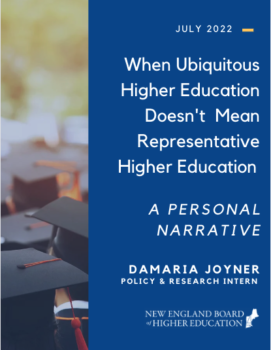 Though home to more than 250 colleges and universities, New England boasts only nine so-called minority serving institutions (MSIs)—institutions focused specifically on providing an abundance of resources to equip minority students with the tools they need to be successful in furthering their education.
Though home to more than 250 colleges and universities, New England boasts only nine so-called minority serving institutions (MSIs)—institutions focused specifically on providing an abundance of resources to equip minority students with the tools they need to be successful in furthering their education.
MSIs are colleges or universities that enroll a high percentage of minority and historically underrepresented students. In New England in particular, most of these nine MSIs serve students who are predominantly Asian American, Native American, Pacific Islander, or Hispanic. It is important to recognize and highlight these MSIs for their efforts to create an environment that is illustrious in curricula and celebrates the unique cultures of their students, while also understanding that there is more work to be done to serve more students of color in the New England region. Achieving this awareness is a crucial step toward creating equity and inclusion in New England higher education institutions.
NEBHE Policy & Research Intern Damaria Joyner’s journey in the Massachusetts school system influenced her decision to leave the region and attend an a historically Black college and university (HBCU), Delaware State University. “It was not until senior year of high school when I experienced having my first Black teacher,” writes Joyner. “From this moment, I realized that there was a lack of representation for teachers of color in my region. I was determined to further my education at an institution where representation of educators mattered and was prevalent. I also chose to attend an institution that would be culturally relevant to myself as a student. It was important to be surrounded and supported by professors who had my best interest academically and personally as a young Black woman.”
Joyner’s process of choosing a college had little to do with the academic rigor of the institution, she notes in her recent personal narrative for NEBHE. “Rather, I sought a more cultural experience where I could learn and converse in an environment that supported me as a student, but also as a student of color. I wrote this personal narrative so that it might resonate with other students of color in New England who have had a similar experience to mine, as well as bring awareness to the greater audience of the importance of the culture of an institution as well as the academic fortitude.”
“From representation within the faculty and staff to the resources offered that go beyond academics to ensure minority students thrive, it is vital that students of color and traditionally underrepresented students in New England and everywhere can feel supported so that they can thrive,” concludes Joyner.
She tells readers she was drawn out of New England for college, and suggests reading her narrative to understand what might have caused her to stay.
[ssba]
